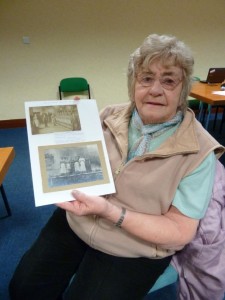We held a Herstory “Bring and Tell” workshop as part of Dundee Women’s Festival in March 2011. Sheila Campbell brought some beautiful photographs of her mother who worked in the jute mills as a young girl. Listen to Sheila and other workshop participants talk about her mother and other memories, or read the transcription below.
Transcription of Sheila and other participants at Dundee Herstory workshop

M: How long did you mum work in the jute mills for?
P2: Not long. She had to leave because of the noise. She hated the noise and because she hated the dust. And then she wouldn’t do any work when we were there. Well, so she tells me. She was a full-time mum and when the war came. She went into munitions. A lot of women went to work in munitions. And she hated that as well because of the noise. And as you were saying, she was a devoted mum, we are all devoted mums. But I remember my granny, my adopted granny said to my mum. My mums name is Christina, which is a nice name. But she was actually called Tin, which is not very nice. And my adopted granny said to my mum, my mum always looked nice, did as much as she could do. But my granny said, ‘I thought you were buying yourself a new coat Tin’, and she said, ‘I’d rather put it on the bairns’. You know because the money was short. It was war time. And then we used to have the Anderson Shelter, do you remember them? You won’t remember them, nobody here will remember them. Under the ground. And I was only a wee girl then, I remember I had a wee pink suit, I must have been only 3 or 4. And I had my wee suit at night and my mum and dad would go down to the shelter. And my dad would carry me on the, you know, the lights, I can’t remember what you call them. Search lights. If they put them on, my dad would always carry me on his shoulders. Another thing I just remembered about the jute mills. At lunch time there was a bummer, you know a bummer, Clarkson sort of style. *Bssssshhhhd*. And then it was time to go for your lunch.
M: So they did half a day at school and half a day at the jute mills?
P2: Half a day at school and half a day at the jute mills.
M: So how many hours would they work there? 4 to 5 hours?
P2: Yeah, 4 to 5 hours, I suppose so.
P3: And did they get the worst jobs or?
P2: Well my mum would, she was a spinner. I don’t know if you saw that, did you see that picture? That’s the spinning. That’s my mum there. And there were spinners and weavers. The weavers were more like a trade. And the spinners, this is what they did. And they worked, sort of, we would call it bonus.
N: Well it must have been quite dangerous.
P2: Yeah, dangerous. The machines were all going, you know, and you had to pull things down – what I’ve seen on the films.
M: The noise must have been unbelievable with all the machines going.
P2: And then on a Saturday when you went into town it must have been such a laugh. Because going down the Wellgate which is nothing like the Wellgate is now. All the streets were there. And the women with their hair and all the colours, they always said the jute was hanging, you could smell the jute out of their hair. And they used roller thinners or curlers or whatever. For Saturday night.
P3: Did they get paid? Did the children get paid, is that why they did it?
P2: Very little. That was in the 1930s, when was the depression. 1929 I think.


Comments are closed.